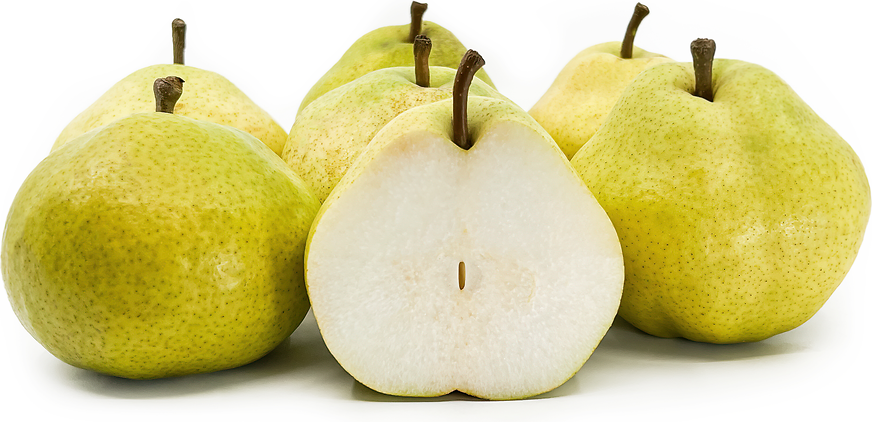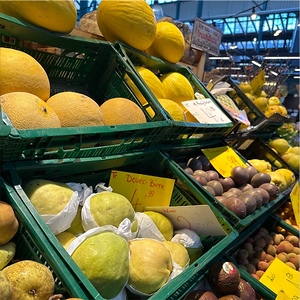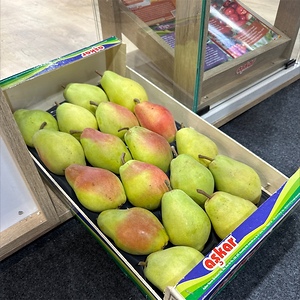


Deveci Pears
Estimated Inventory, lb : 0
Description/Taste
Deveci pears are a large varietal, averaging 10 to 12 centimeters in diameter, and have a bulbous, pyriform appearance with a wide bottom, squat neck, and a lumpy nature. The pears are heavy for their size, weighing anywhere from 200 to 350 grams, and some pears can grow as large as 1 to 2 kilos. The skin is thin and taut, showcasing hues of pale yellow-green, and the surface is covered in dark brown-grey lenticels. Deveci pears have a pebbled, lightly rough texture, and if the fruits are exposed to the sun they may develop a faint red-pink blush. Underneath the surface, the white flesh is firm, coarse, crisp, and crunchy with a snappy consistency. The flesh is also bursting with juice, creating a juicy, refreshing feel, and there is a central core filled with tiny dark brown seeds. Deveci pears are aromatic with a light, sweet, and vegetal scent and have high sugar content mixed with low acidity, creating a mild, sugary, floral, and subtly tangy taste.
Seasons/Availability
Deveci pears are available in the mid-fall through winter in Turkey. The variety's harvest date is variable depending on the altitude that the fruits are grown at, with lower altitude trees producing fruits earlier than higher altitude regions. Once harvested, Deveci pears can be kept in professional cold storage for over seven months.
Current Facts
Deveci pears, botanically classified as Pyrus communis, are a Turkish variety belonging to the Rosaceae family. The cultivar is one of the largest pears commercially produced in Turkey, sometimes weighing over two kilos, and is a late-season pear, fulfilling a gap in the country's pear season. Deveci pears are valued for their size, extended storage capabilities, and sweet, sugary taste, said to have the texture of an Asian pear combined with the aromatic nature of a European pear. Since their release in the late 20th century, Deveci pears have become the most exported pear variety from Turkey. Growers favor the cultivar for its high yields and the fruits are hardy and durable, able to be shipped long distances without damage. Deveci pears are commercially marketed as a versatile fruit, utilized in both fresh and cooked culinary preparations.
Nutritional Value
Deveci pears are a source of vitamin C to strengthen the immune system while reducing inflammation and potassium to balance fluid levels within the body. The pears also provide fiber to regulate the digestive tract, copper to develop connective tissues, magnesium to regulate optimal nerve functioning, and phenolic compounds to contribute anti-inflammatory and antioxidant-like properties to boost overall health.
Applications
Deveci pears have a mild, sweet taste suited for fresh and cooked preparations. The variety is known for its firm, crisp, and aqueous nature, leading the pears to be a popular fruit to eat straight out of hand. Deveci pears can also be sliced and served with cured meats on appetizer platters, chopped and tossed into salads, or thinly cut and added to slaws. In Turkey, Deveci pears are commonly pressed into juices, blended into smoothies, or added to other beverages as a refreshing element. Deveci pears can also be utilized in cooked preparations and are often simmered with butter and sugar to create caramelized slices. Beyond caramelization, Deveci pears can be glazed and served with roasted meats, poached and served with other fruits, baked into a galette, pie, or crisp, or cooked into an applesauce. The pears can also be cooked and used as a topping over savory soups, waffles, or stuffing. Deveci pears complement other ingredients such as quince, apples, pomegranate seeds, cheeses such as goat, blue, and brie, roasted meats including poultry, turkey, and beef, balsamic vinegar, clotted cream, and honey. Whole, unwashed Deveci pears are known for their extended storage capabilities. The pears can be kept for several months when stored in a cool, dry, and dark place. In professional storage, the pears can be stored for over seven months.
Ethnic/Cultural Info
Deveci pears were named after Turkey's "prince of fruits," Lutfi Deveci. Deveci grew up with a passion for agriculture and longed to study in Europe, especially in Germany. Despite his dreams, Deveci was unable to afford schooling in Europe and instead attended the Bursa Agricultural School in Turkey. During his studies, Deveci was educated by teachers from Europe, allowing him to become familiar with European breeding practices, and after graduation in 1932, Deveci accepted a position as Samsun Agriculture Directorate. This position allowed Deveci to become known within the Samsun community as an agricultural leader, and at one point, he was able to purchase around 12 acres of land from the mayor to begin his first nursery in 1936. Throughout his career, Deveci had to overcome many obstacles to establish an agricultural base in Samsun, and many residents thought that his dreams were foolish. There are several written accounts from Deveci about the hardships he faced, but even after these setbacks, Deveci persevered and eventually created a 49 acre orchard with trees of American and European origin. Deveci's most famous achievement was his creation of Deveci pears. The story goes that Deveci was returning home from hunting when he noticed a pear on the trail he was walking on. This surprised Deveci as it was not the season for pears, and the large fruit was perfectly intact. Deveci searched for the tree and discovered the pear tree growing in the dense forest along the trail. The agronomist took cuttings from the tree and grafted them onto rootstock in his orchard. Three years later, Deveci was producing pears weighing over 1.5 kilograms, which were some of the largest pears grown in Turkey.
Geography/History
Deveci pears were discovered in the early 1960s in Samsun, Turkey. Agronomist and fruit breeder Lutfi Deveci found the pears growing naturally on a tree in a dense forest when he was walking on a nearby hunting trail. Deveci took cuttings from the tree and grafted the pieces on French and Italian rootstock to propagate the variety for commercial cultivation. Over time, Deveci eventually released the new variety under his family name, and the pears quickly increased in notoriety throughout Turkey for their extended storage capabilities, flavor, and size. Deveci pears spread throughout Turkey and were selected as a commercially important cultivar for the export market. Today Deveci pears are primarily grown in the Bursa Province and the city of Samsun in Turkey. Within Bursa, the village of Agakoy and the Gursu Plain produce the highest concentrations of Deveci pears. Agakoy is considered one of the richest villages in the Bursa Province and this is due to their sole production of Deveci pears. The Gursu Plain is nicknamed "Turkey's Pear Orchard," and the area received a Geographical Indication in 2019 for its Deveci pears, producing around four times more than the country's average. Deveci pears are one of the most exported pear varieties of Turkey. The cultivar is highly valued in the Middle East, Russia, and Central Asia. Since the mid-21st century, Deveci pears are also being exported into Europe, where they are increasing in popularity as a specialty variety. The pears have seen the most success in German fresh markets. The Deveci pears featured in the photograph above were sourced through the Istanbul Supermarket and the Wochenmarkt Winterfeldplatz in Berlin, Germany.









